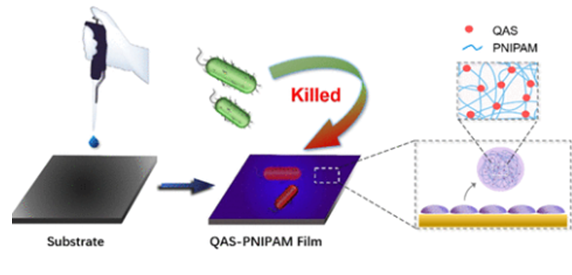Welcome to College of Chemistry, Chemical Engineering and Materials Science of Soochow
University
Universal Antibacterial Surfaces Fabricated from Quaternary Ammonium Salt-Based PNIPAM Microgels
Ziqing Zhao1, Xiaoliang Ma1, Rui Chen1*(陈蕊), Hui Xue1, Jiehua Lei2, Hui Du2, Zexin Zhang1*(张泽新), and Hong Chen1*(陈红)
1State and Local Joint Engineering Laboratory for Novel Functional Polymeric Materials, College of Chemistry, Chemical Engineering and Materials Science, Soochow University, Suzhou 215123, P. R. China
2 Jiangsu Biosurf Biotech Company Ltd., Suzhou 215123, P. R. China
ACS Appl. Mater. Interfaces 2020, 12, 19268--19276
Because of the excellent film-forming ability of poly(N-isopropylacrylamide) (PNIPAM) microgel and high-efficient bactericidal property of quaternary ammonium salt (QAS), QAS-based PNIPAM (QAS-PNIPAM) microgels are synthesized and employed to modify the surface of a range of commonly used materials including metal, plastic, and elastomer. Bacterial culture is carried out on such QAS-PNIPAM microgel-modified surfaces to examine the viability of the attached bacteria. It is found that the bactericidal efficiency is nearly 100% on the modified surfaces of all the studied materials. We attribute the high-efficient bactericidal performance of QAS-PNIPAM microgel film to the QAS component rather than the topography of the microgel film itself. In addition, the microgel film is robust and shows great integrity even after culture of the bacteria and repeated rinses, and the cell experiment demonstrates that this microgel film is cyto-compatible. Therefore, such a simple, versatile method of preparing antibacterial films paves the way for future bactericidal applications.

链接:https://pubs.acs.org/doi/abs/10.1021/acsami.0c00791